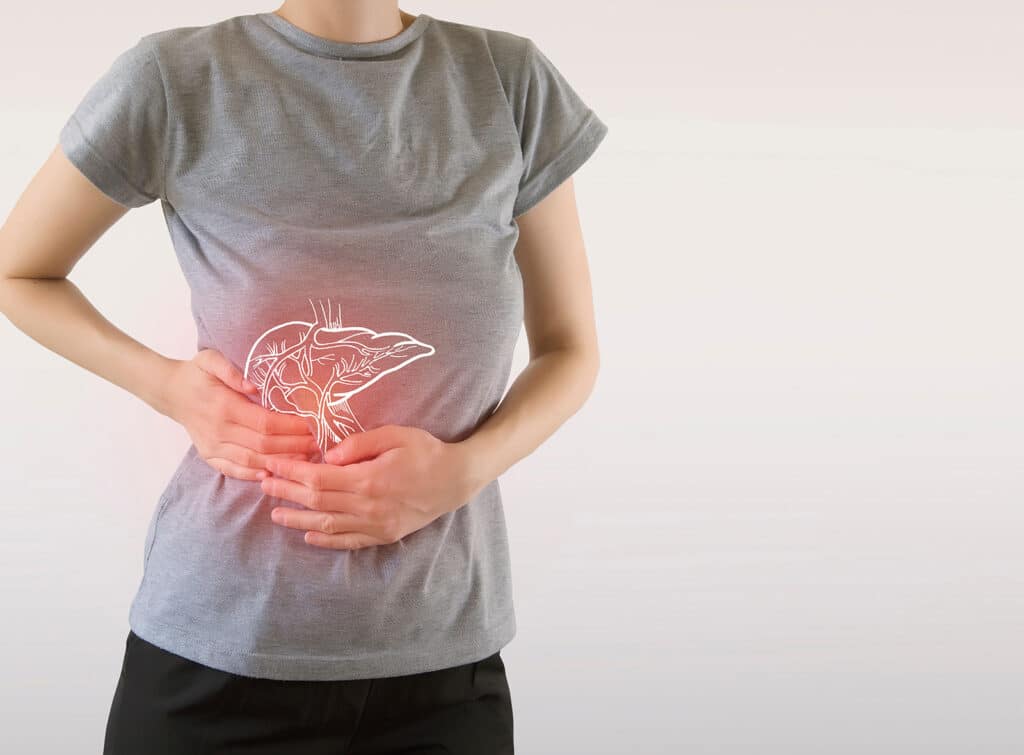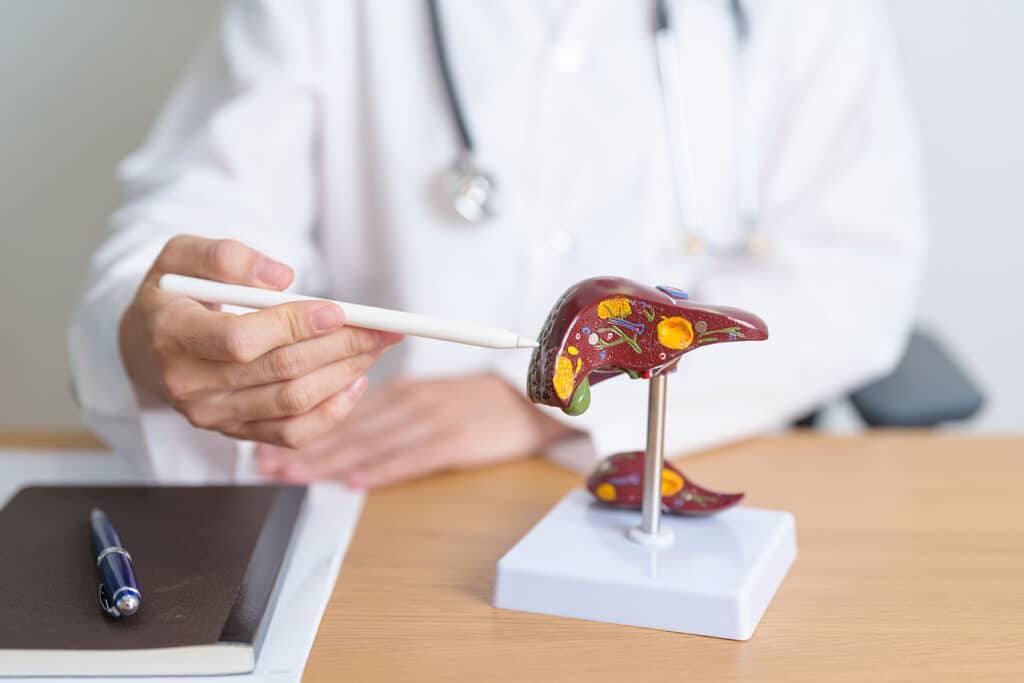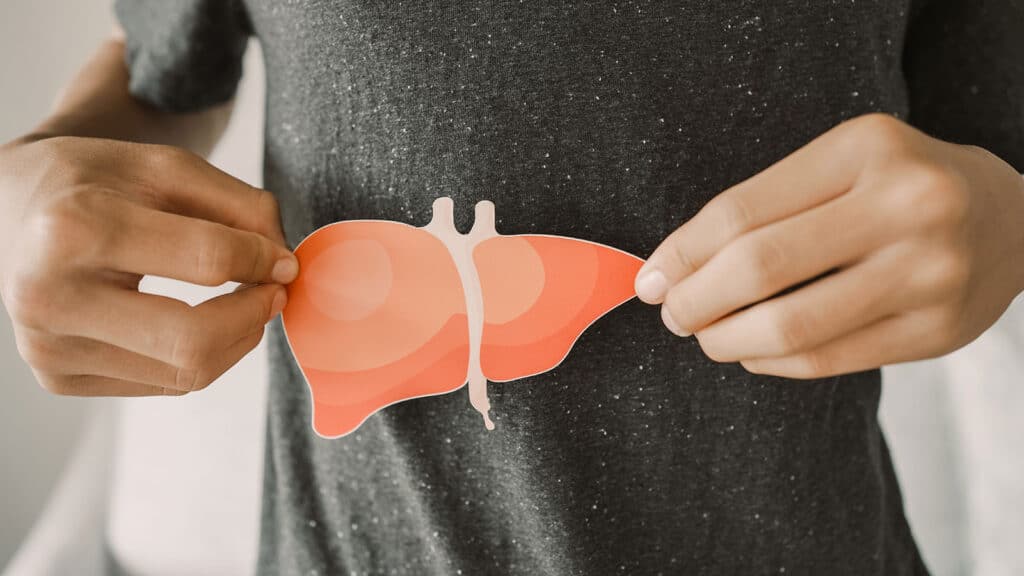Your liver is a large organ that regulates many bodily functions, including digestion and removing toxins, drugs and bacteria from your system. When disease or alcohol damages the liver, your body cannot process these substances as it should. The buildup of these waste materials could result in liver failure and death. Fortunately, this organ has a remarkable ability to heal itself.
This article explains the causes, stages and effects of liver disease. It then discusses steps to stimulate healing if you or a loved one have a damaged liver.

Table of Contents
Understanding Liver Damage
In many cases, liver damage is reversible. In fact, it regenerates without any medical intervention after a surgeon removes a tumor or scar tissue. The extent of the damage determines if the healing time is weeks or months. The liver can only handle a specific amount of alcohol at a time, though some liver problems can be completely reversed if you stop drinking alcohol.
Causes of Liver Damage
Liver damage may result from a tumor, excess copper or iron, infections or alcohol. For healing to start, you must abstain from drinking alcohol.
Stages of Liver Disease
Inflammation is the first stage of liver disease as the body struggles to remove toxins. The liver may swell, and the upper right-hand part of your abdomen may feel warm and tender to the touch. Damage at this stage is reversible if patients visit their doctor.
If the inflammation continues unabated, it eventually causes liver tissue scarring, which hinders the liver’s ability to heal itself. This tendency to scar is called fibrosis and has a cumulative effect. As the scarring increases, the blood supply is blocked, and the tissue dies. The damage is still reversible at this stage.
Cirrhosis of the liver involves severe scarring, which may be irreversible. However, it could take decades for you to reach this stage. It’s essential to see a doctor if the upper right-hand quadrant of your abdomen feels bloated, tender or itchy.
Liver failure is the last stage of liver disease and occurs when the tissue is so severely damaged that the liver no longer functions. At that point, the only viable treatment is a liver transplant.
Effects of Liver Damage on the Body
Liver damage impairs the immune response and blood clotting, so you might find yourself experiencing infections more frequently and bleeding more than usual when you cut yourself. This clotting deficiency may also manifest as bruising. Other deficiencies can cause your arms and legs to swell.
Signs of Liver Damage
In addition to the previously mentioned symptoms, here are some other signs that you may be suffering from liver damage:
- Jaundice (yellowing of the skin or whites of the eyes)
- Abdominal pain and swelling
- Nausea and vomiting
- Fatigue and weakness
- Dark urine and pale stools
Signs of Healing
Once the liver begins healing, you’ll feel better and more focused as the brain fog lifts and the toxins leave your body. Here are some signs that you’re on the road to recovery:
- Reduction in jaundice
- Improved energy and stamina
- Reduction in abdominal pain and swelling
- Improvement in digestive health
- Normalization of liver enzyme levels

Factors Affecting Liver Healing
Many things affect the rate and degree of healing. The longer the disease goes undetected, the longer it will likely take to heal once you start taking corrective measures. Here are some factors that can delay the healing process.
Underlying Medical Conditions
Alcohol abuse causes extensive damage to the liver. As the organ tries to metabolize the ethanol, the process releases toxins that kill liver cells. Eventually, the liver loses its ability to regenerate.
Anyone suffering from hepatitis A, B, or C needs to recover from the infection for the liver to heal. There are treatments for types B and C, and type A usually disappears after a few weeks. Prolonged inflammation from alcoholic hepatitis can lead to extensive scarring, cirrhosis and liver failure.
Obesity, diabetes and heavy binge drinking of alcohol are associated with fatty liver disease. The patient needs to get these factors under control before the disease progresses and damages the liver.
Lifestyle Factors
If you have liver disease, alcohol use is one of the worst things you can do. Consuming more alcohol daily than the liver can process may cause liver damage. This amount could be as little as two to three drinks in 24 hours. Heavy Drinking every day doesn’t allow the liver time to recover.
You need to protect yourself from viral hepatitis. Protection means getting vaccinated, practicing safe sex and not sharing needles.
A balanced diet helps promotes liver healing. Avoid processed foods and liquids high in unhealthy fats, sugar and salt. Controlling blood sugar and lowering cholesterol levels are keys to a healthy liver.
Since obesity is one of the negative factors affecting the liver’s ability to self-heal, you should take steps to reduce your weight. Exercising more and eating smaller, healthier portions is a tried-and-true way to achieve your goals.
Medications and Supplements
Some common pain and anti-inflammatory drugs inhibit healing if you exceed the recommended dose. These medicines include Tylenol, aspirin and ibuprofen.
Do not take supplements containing aloe vera, kava, black cohosh, ephedra, chaparral or comfrey. These may harm a weakened liver.
Age and Genetics
As you age, your liver’s ability to regenerate slows down, making the healing process take significantly longer than it would in a younger person.
There are some liver-damaging gene mutations that you can inherit. Patients with Wilson disease accumulate excessive copper in their livers. Another mutation results in hemochromatosis, which causes iron buildup in the liver. In addition, recent scientific studies indicate that a genetic mutation may cause fatty liver disease. However, while that may be true, not all mutations are harmful. Scientists have found relatively rare mutations that help prevent liver disease, and this type of research may lead to new and exciting preventative treatments.
Methods to Promote Liver Healing
You need to take control of your life to maintain a healthy liver. Here are some practical steps you can take:
- Limiting alcohol intake
- Eating a diet that includes skinless poultry, whole grains, fruits and vegetables
- Getting regular exercise
- Managing underlying medical conditions, including diabetes and obesity

Monitoring Liver Health
If you drink alcohol regularly, your doctor might want to check the health of your liver periodically. If your liver is already damaged, your caregiver will want to track the progression or recovery from the alcohol-related liver disease. Fortunately, there are blood tests available that can gauge the health of your liver.
Importance of Regular Liver Function Tests
Since the liver is such a critical organ, susceptible or diagnosed individuals want to ensure that they aren’t heading toward liver failure. If that happens, their only recovery option is a liver transplant. These tests are also helpful if you take medication that may adversely affect the liver.
Working with a Healthcare Professional
A hepatologist is a doctor who specializes in liver, pancreas, gall bladder and bile duct disorders. A gastroenterologist focuses on the digestive system, which includes the liver. If you want routine screening, your primary physician can order those tests for you and refer you to a specialist if there are abnormal results.
Working with a healthcare team can help you maintain a lifestyle that promotes liver healing. For example, the team may make dietary and exercise suggestions and work with you to reduce or eliminate alcohol intake.
Tracking Symptoms and Progress
Blood tests measure the levels of enzymes and proteins, among other things, that the liver produces. A clear picture of the liver’s health comes into focus by comparing normal and test levels. While the liver can heal itself, you don’t want to engage in damaging behavior unknowingly. The blood tests will let you know if you’re on the right track to recovery or need lifestyle changes to enhance healing.
Conclusion
Your liver is an amazing organ that regulates many bodily functions and can regenerate when damaged. However, some lifestyle choices can interfere with your recovery. Alcohol addiction or excessive alcohol, in particular, is very damaging. Accumulated toxins in the liver that are released by breaking down the ethanol destroy liver cells, causing scarring. Scarred tissue cannot regenerate, so the liver remains permanently altered.
Symptoms like nausea and fatigue are common in many illnesses. However, if you notice a yellowing of your skin or eyes, that’s a clear indication of possible liver disease. Make the necessary changes in your lifestyle to promote liver healing. The greatest thing you can do if you have cirrhosis is to quit drinking as soon as possible and get medical advice on managing your condition. If you need assistance reducing your alcohol consumption, contact Miracles Recovery Center.
FAQ
How does the liver heal itself?
What are some signs of liver healing?
How long does it take for the liver to heal?
What can I do to support liver healing?
Can the liver heal after cirrhosis?
Can the liver heal after stopping alcohol consumption?
Can diet and lifestyle changes improve liver health?
When should I seek medical help for liver issues?
Can liver supplements help with liver healing?
Can all liver damage be reversed?
